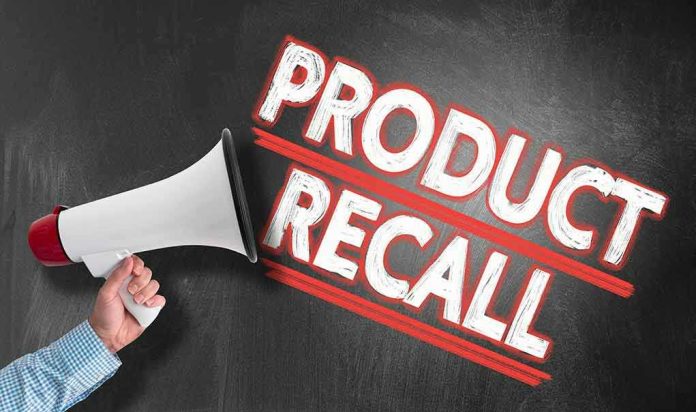
One mislabeled box on a freezer shelf can turn a dinnertime staple into a hidden minefield—Aldi’s nationwide recall of veggie spring rolls exposes how a simple labeling slip can threaten lives, reputations, and consumer trust in an instant.
Story Snapshot
- Aldi recalled Fusia Asian Inspirations Veggie Spring Rolls sold nationwide for containing undeclared shrimp, a major allergen.
- The recall was triggered by a labeling error—packages marked “vegetable” actually contained shrimp spring rolls.
- No allergic reactions have been reported yet; the recall is proactive and ongoing.
- The incident underscores the persistent risks of allergen mislabeling and its impact on consumer safety and corporate responsibility.
When Dinner Turns Dangerous: The Anatomy of a Recall
Nationwide, shoppers trust that what’s in the box matches what’s on the label. On October 9, 2025, that trust was tested when Aldi, partnering with Tai Foong USA, issued a sweeping recall of Fusia Asian Inspirations Veggie Spring Rolls. The culprit: shrimp—an ingredient absent from the label but present in the rolls. For Americans with shellfish allergies, this isn’t a minor mix-up; it’s a potentially life-threatening hazard. Aldi’s recall, spanning every store coast-to-coast, became a flashpoint for debates on food labeling, corporate transparency, and the hidden perils lurking in the frozen aisle.
The spring rolls in question bore a vegetarian promise. The label, the UPC (4099100222258), and the best before date (5/17/2027) all suggested a safe, meatless appetizer. Instead, a packaging snafu swapped shrimp spring rolls into boxes labeled as veggie. The error, uncovered during either routine quality checks or after consumer complaints, forced Tai Foong USA and Aldi into immediate damage control. No allergic reactions have surfaced yet, but the recall’s urgency highlighted the razor-thin line between routine oversight and disaster.
The Domino Effect: Food Safety, Trust, and Accountability
Every food recall echoes through the supply chain, but undeclared allergens hold a special menace. Regulatory agencies like the FDA and USDA require unwavering vigilance: one wrong ingredient, one missed label, and lives hang in the balance. Aldi’s recall is not its first—previous years saw cheese, taquitos, and other frozen foods pulled from shelves for undeclared allergens or contamination. These repeated episodes reinforce a sobering reality: even industry giants struggle with quality control in sprawling, global supply chains. For consumers, each incident chips away at confidence in private-label brands and the safety nets supposedly in place.
Spring rolls recalled from Aldi for a possibly ‘life-threatening’ problem https://t.co/YkKBdjoQ2U
— Mahoning Matters (@MahoningMatters) October 9, 2025
For Aldi and Tai Foong USA, the stakes are more than financial. Brand reputation, customer loyalty, and regulatory compliance ride on the outcome. Immediate removal of the product, public statements, and full refunds are just the first steps. Behind closed doors, quality assurance teams and food safety authorities dissect the misstep, searching for process flaws and human errors that let shrimp slip where it shouldn’t. The pressure is on to fortify systems, retrain staff, and assure regulators—and the public—that this won’t happen again.
Ripple Effects: Why This Recall Matters to Everyone
While the immediate threat targets those with shellfish allergies, the broader consequences ripple outward. Every recall costs millions in lost sales, logistics, and potential litigation. More insidiously, it seeds doubt in the minds of shoppers who expect transparency and safety from their retailers. Social media amplifies every recall notice, turning a single error into a national talking point. For the food industry, Aldi’s situation is a cautionary tale—a reminder that the next labeling error could happen anywhere, to anyone, at any time.
Experts in food safety and public health point to these recalls as evidence of systemic vulnerability. Allergen management demands relentless attention to detail, robust supply chain tracking, and an institutional culture that prizes consumer safety above convenience or cost-cutting. Some analysts praise Aldi’s swift, voluntary recall as a sign of corporate responsibility; others see it as proof that existing safeguards remain imperfect. The consensus is clear: as food manufacturing grows more complex, the risks—and the need for vigilance—only multiply.
Sources:
Green Matters: Aldi Food Recalls 2025
Delish: Aldi Vegetable Spring Roll Recall
Aldi Official Newsroom: Product Recalls
AOL: Aldi Issues Urgent Recall on Frozen Food







